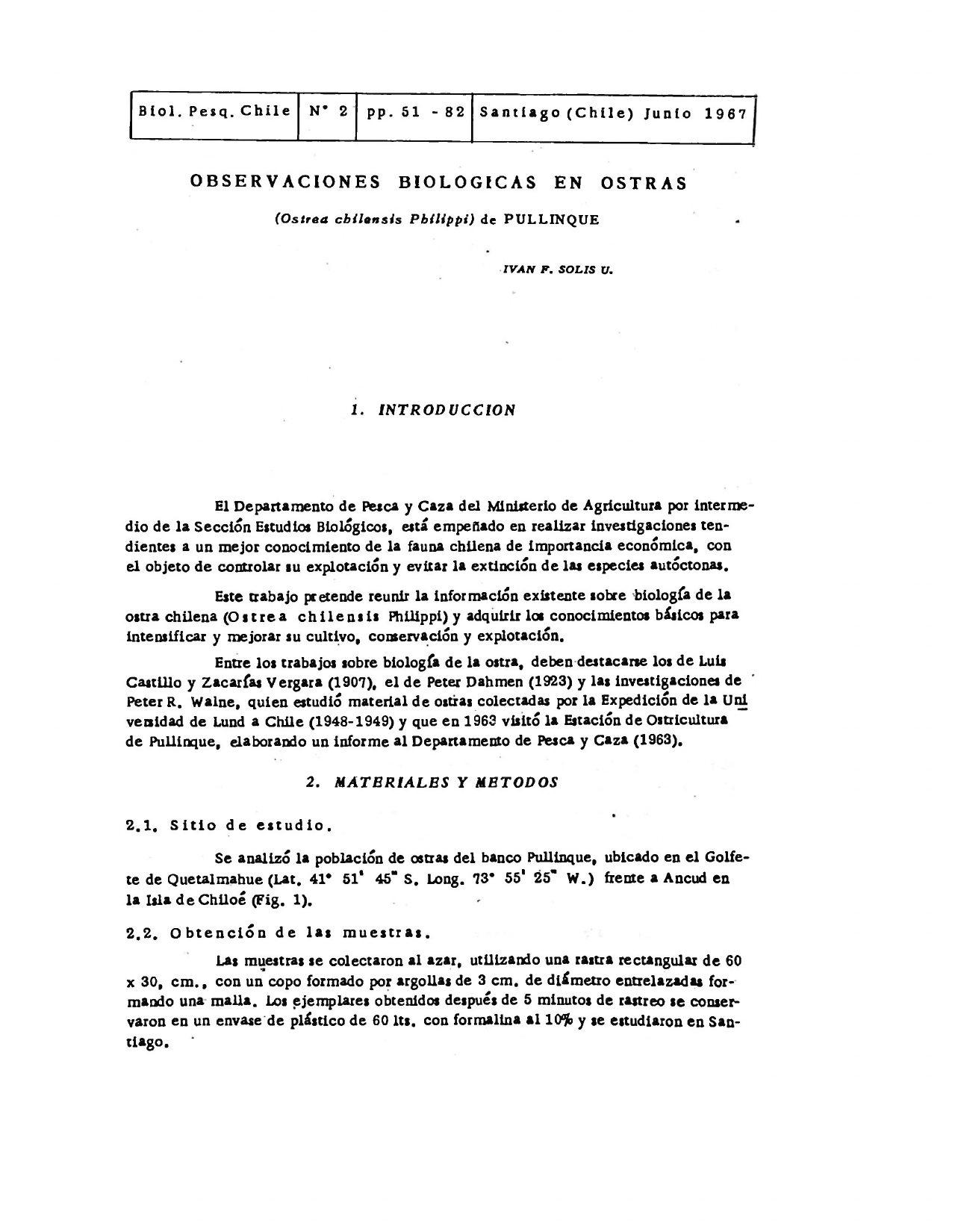Observaciones Biológicas en ostras (Ostrea chilensis Philippi) de Pullinque
DOI:
https://doi.org/10.21703/0067-8767.1967.2.2361Abstract
The oyster (Ostrea chilensis Phil.) population is analyzed at Pullinque located in the Quetalmahue Gulf (lat. 44° 51' 45'' S. long. 73° 55' 25'' W) forehead of Ancud in Chiloe Island, Chile. It is a natural population repopulated with oysters from the Pullinque oyster fishery collectors. Oysters were collected with a dredge at random. They were obtained monthly for 16 months (January, 1965 to April, 1966), with the following conclusions:
1.- The bank has a surface of 162,698 m². Its population was estimated to have 2,391,661 oysters, with an average density of 14.7 oysters per square meter (Fig. 2).
2.- The population size is uniform ranging from 15 to 18 mm. The smallest oyster having 17 mm and the biggest 87 mm. The highest frequencies (62.4%) are found between 55 and 65 mm. (Fig. 2–3).
3.- Ostrea chilensis is monoecius but it presents alternative sexes. Fecundation is internal and all the egg and larvae development process occurs inside the oyster epibranchial chamber (viviparous oyster) (Fig. 4 a–m).
4.- The liberated larvae is well developed (Fig. 4 g–l) and it has a short planktonic life.
5.- The larvae liberation occurs between September and March (Fig. 6).
6.- The gonads and larvae development is related to the water temperature and the spawning takes place with a temperature between 14 and 22°C. (Fig. 7)
7.- Weight-size relationship. As they increase in size they gain weight (Fig. 10, Annex 5–6). The same thing happens with wet weight and shell weight.
The maximum weight of the oyster edible part occurs together with the gonadic ripening in August–September (Fig. 5). Minimum weights were observed between November and February in relation to the larvae liberation.
8.- Oyster growth is shown in Figs. 8–9 and it occurs as follows.
References
ANDREU, B. y ARTE, P. 1955. Experiencias previas sobre fijación de larvas y crecimiento invernal de la ostra (O. edulis) joven en las rías gallegas (N.W. de España). Instituto Biol. Aplic. (XIX): 115–129.
BAIRD, R.H. 1958. Measurement of condition in Mussels and Oysters. Journ. du Cons. Inter. Explor. de la Merc. 23 (2): 249–257. https://doi.org/10.1093/icesjms/23.2.249 DOI: https://doi.org/10.1093/icesjms/23.2.249
BANCROFT, HULDAH. 1960. Introducción a la Bioestadística. Edit. Univ., Buenos Aires.
BUEN, FERNANDO DE. 1957. Ostricultura Intensiva y Extensiva. Bol. Inf. N°s 49; 50 y 51. Departamento Fomento de Pesca y Caza (Chile).
CASTILLO, LUIS Y VERGARA, ZACARÍAS. 1907. Apuntes biológicos e industriales sobre la ostra de Chile. Sección Agua y Bosques, Ministerio de Industria. 1907.
CERRUTI, ATTILIO (X). 1941. Osservazioni ed esperimenti sulle cause di distruzione delle larve d’ostrica nel Mar Piccolo e nel Mar Grande di Taranto. Archivio di Oceanografia e Limnologia, Anno 1; 165–201.
COE, WESLEY R. 1931. Spermatogenesis in the California oyster (O. lurida). Biol. Bull. (61) 3: 309–315. DOI: https://doi.org/10.2307/1536950
COE, W.R., 1934. Alternation of sexuality in oysters. American Nat. (68): 236–251. https://doi.org/10.1086/280542 DOI: https://doi.org/10.1086/280542
COLE, H. A. 1941. The fecundity of Ostrea edulis. Journ. Mar. Biol. Assoc. U. K. (25) 2: 243–260. https://doi.org/10.1017/S0025315400054710 DOI: https://doi.org/10.1017/S0025315400054710
DAHMEN, PETER. 1923. Anatomie von Ostrea chilensis Philippi. Jenaische Zeitschrift für Naturwissenschaft, Band 52: 575–626.
DALL, W.H. 1909. Report on a collection of shells from Peru, with a summary of the littoral marine Mollusca of the Peruvian Zoological Province. Proc. U.S. Nat. Mus., Vol. 37 N° 1704. DOI: https://doi.org/10.5479/si.00963801.37-1704.147
DANTAN, M. 1913. La fécondité de l’Ostrea edulis (L.). Comptus Rend. Hebdomadaires des séance, tome 157: 871–873.
DAVIS, H.C. 1949. On cultivation of larvae of Ostrea lurida. Anat. Record (Abstract) 105 N° 3; 591–592.
GALTSOFF, PAUL S. 1964. The American Oyster. Fish. Bull. 64. Dept. Int. Fish and Wildlife Service U.S.A.
HUPE, L. H. 1854. Fauna chilena. Moluscos. En Gay, Claudio. Historia Física y Política de Chile. Zoológica 8, París.
INFORME. 1966. Informe del Dr. Julio Orrego a la Dirección del Departamento de Pesca y Caza por prospección del banco Pullinque efectuada por los Técnicos Pesqueros de IFOP, señores Sergio Santa Cruz y Luis González M.
KORRINGA, P. 1947. Relations between the moon and periodicity in the breeding of marine animals. Ecol. Monographs (17) 3: 347–381. https://doi.org/10.2307/1948665 DOI: https://doi.org/10.2307/1948665
LOOSANOFF, VICTOR L. 1939. Spawning of Ostrea virginica at low temperatures. Science (89) N° 2304: 177–178. https://doi.org/10.1126/science.89.2304.177 DOI: https://doi.org/10.1126/science.89.2304.177
LOOSANOFF, V.L. 1945. Precocious gonad development in oysters induced in mid winter by high temperature. Science (102) N° 2,640: 124–125. https://doi.org/10.1126/science.102.2640.124 DOI: https://doi.org/10.1126/science.102.2640.124
LOOSANOFF, VICTOR L., y DAVIS, H.C. 1952. Temperature requirements for maturation of gonads of northern oysters. Biol. Bull (103) N° 1: 80–96. https://doi.org/10.2307/1538408 DOI: https://doi.org/10.2307/1538408
MORONEY, M. J. 1965. Hechos y estadísticas. Edit. Univ. Buenos Aires.
NEWCOMBE, CURTIS L. 1950. An analysis of certain dimensional relationships of the virginia oyster, Crassostrea virginica (Gmelin). American Nat. (84) 816: 203–214. https://doi.org/10.1086/281623 DOI: https://doi.org/10.1086/281623
PEÑA, GONZALEZ MARIO. 1960. Datos ecológicos sobre los moluscos de valor económico en los Esteros de Puerto Pizarro. Rev. Pesca y Caza N° 10, Dic. 1960. Dirección de Pesca y Caza. Ministerio de Agricultura Perú.
SOOT-RYEN, T. 1958. Pelecypoda. Rep. Lund University Chile Expedition 1948–1949.
STEMPELL, Dr. WALTER. 1902. Die muscheln der Sammlung Plate (Systematische Uebersicht). Zoologische Jahrbücher supplement – Band V. Fauna chilensis II Band.
THIELE, JOHANNES. 1963. Handbuch der Systematischen Weichtierkunde.
WALNE, PETER R. 1958. Growth of oysters (Ostrea edulis L.). Apart. Journ. Mar. Biol. Assoc. U. K. 37, t: 591–602. https://doi.org/10.1017/S0025315400005634 DOI: https://doi.org/10.1017/S0025315400005634
WALNE, P. 1963a. The oyster fishery of the Golfo Quetalmahue. Informe al Departamento de Pesca y Caza, 8–IV–1963.
WALNE, P. R. 1963b. Breeding of the chilean oyster (Ostrea chilensis Phil.) in the laboratory. Nature 197, N° 4868: 676. https://doi.org/10.1038/197676a0 DOI: https://doi.org/10.1038/197676a0
WILBUR, KARL.M. y OWEN, GARETH. 1964. Growth, in Physiology of Mollusca, I. Acad. Press. DOI: https://doi.org/10.1016/B978-1-4832-3241-6.50013-5
YONGE, C. M. 1960. Oysters. Ed. Collins, 1960. The new naturalist.




